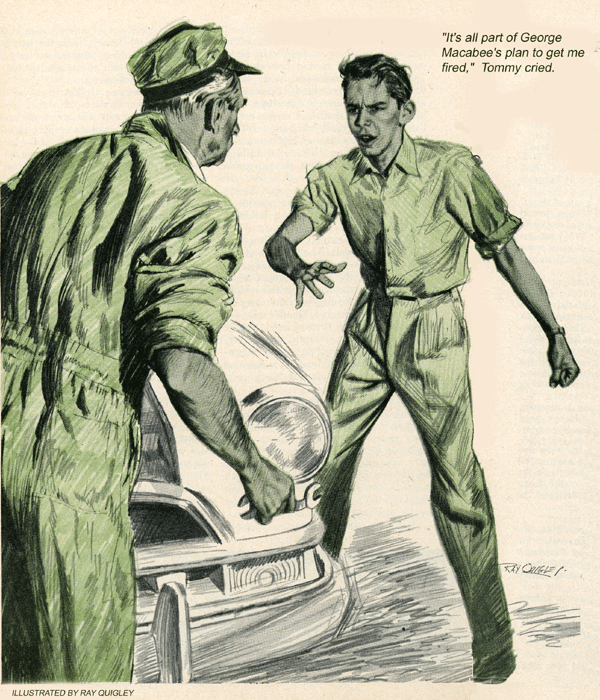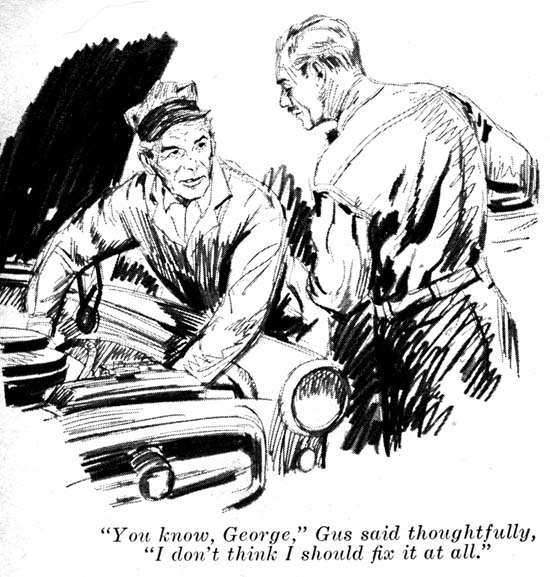June 1957
GUS RESCUES A RIVAL MECHANIC
by Martin Bunn

When Tommy Brown came into the Model Garage, Gus Wilson noted that his normally pleasant expression was missing.
"Mr. Wilson," he said, "I've half a mind to punch George Macabee in the nose."
Gus could hardly keep from smiling. This thin-shouldered lad of 18 was threatening to wallop burly George Macabee?
"Now why would you want to do that, Tommy?" Gus asked.
"For some reason," Tommy said, "George Macabee is trying to get me fired from my job at the creamery. You know I got promoted from maintenance helper for Mike Pagett on the day shift, to light repair of the creamery's rolling stock at night. Every evening drivers list on a complaint sheet what's wrong with their cars and trucks. I fix them during the night. I was doing all right until George Macabee started putting down the same squawk every night about his salesman's car. There's nothing wrong with it."
"That doesn't sound like a thing that George Macabee would do, Tommy," Gus said reflectively.
Gus had a strong hunch that things were not as Tommy thought. But to scoff at his convictions might turn the youngster away from adult influence when he needed it most. Tommy's father was dead, and he often came to Gus for advice.
Gus put a hand on Tommy's shoulder. "Sounds like a pretty low trick," he said. "What does he claim is wrong with his car?"
"Nothing serious," Tommy said. "He's too smart for that. If it was serious, the car would be laid up and sent into the day-shift garage for major repairs, since I'm only supposed to handle minor ones. He just claims it backfires, loses power and misses every now and then. I've checked it all over and there's nothing wrong with it. If Macabee keeps complaining, first thing you know I'll get fired."
Gus asked, "Then why not get Pagett to send the car to the garage so your regular mechanics can look it over?"
"That's just what Macabee wants," Tommy cried. "It's all part of his plan to get me fired! The mechanics wouldn't find anything wrong. But after they finished tinkering, Macabee would claim that it ran all right and that they'd fixed something I'd overlooked. I'd be in Dutch for sure."
"I see," Gus said. "Well, if George Macabee thinks he can get away with anything like this, he's mistaken. Late tonight I'll come down to the creamery and we'll go over that car together, Tommy. Then if Macabee tries to keep up this farce, we'll call him."
Tommy's eyes sparkled. "I knew you could do something about it. Boy, will Macabee back off when you ask him what he's trying to pull! We'll teach him a lesson."
"Maybe so, Tommy," Gus said soberly. "And lessons never hurt anyone."
Actually, knowing George Macabee well, Gus was sure that he wouldn't engage in the tactics Tommy suggested. During the day, Gus managed to reach the creamery salesman by telephone.
"George," he said over the line, careful not to violate Tommy's confidence, "I've heard a rumor -- about something wrong with your car that has Tommy, down at the creamery, worried a bit. I wouldn't want the kid to think that I was nosing into his business, but could you drop around and let me take a look at the car?"
"Sure thing, Gus," Macabee said. "To tell you the truth, I was starting to worry about getting the kid in bad."
When Macabee drove into the Model Garage that afternoon, Gus found, as Tommy had said, that the car was purring nicely. Still, somewhere, Gus was sure, was some kind of off-on trouble that Tommy must have overlooked. But after an hour's work on the car and a test drive, Gus found nothing. All he could hang on to was his conviction that Macabee wasn't just out to get Tommy fired.
This car was sweet. Its compression was on the nose, which meant sound rings and valves. Ignition points were new perfectly gapped and aligned. The spark was fat and perfectly timed coil and condenser meeting all tests. The carburetor was clean, float level right. There were no blown gaskets; no loose or corroded wiring connections; no oil-soaked, frayed or broken wires or battery cables. A voltmeter showed no abnormal resistance on the line.
Gus backed to the bench at last, ran his hands through his graying hair.
"And still you say that this car backfires, misses and loses power, George?" he said.
"That's right," Macabee declared. "And then suddenly it runs okay. It happens three or four times a day."
"Sounds like it's jumping out of time," Gus said thoughtfully, "which would mean badly worn timing gears at the lower end of the distributor shaft. What gets me is that I've never seen a set of gears worn so that they could jump out of time and back again at will."
Gus decided to take a look at those gears. He pulled the distributor and its hose, then the short distributor drive shaft that ran down through the engine block to the gear at the camshaft. This distributor shaft was equipped with female drive slots at each end, which received male driving wedges at the distributor and the gear. The upper female drive unit was enclosed in a round, revolving bushing that rode the engine head.
Gus stared at the bushing a moment, then peered at the head. "Here's your culprit," he told George Macabee, pointing to a small depression in the head, evidently cut by the bushing. This had permitted the shaft to drop away a bit from the distributor, just enough so the drive slot on its upper end could disengage at times from the male wedge of the distributor.
Gus proved this by reassembling the parts. He found that with a bit of finger pressure he could turn the distributor rotor all the way around. The distributor shaft had apparently been manufactured a bit too short.
"I can see why the car acts up," Macabee said. "But I can't see how it manages to jump back into time again."
Gus kept turning the rotor, and presently there was a clicking sound.
Gus grinned. "Here's your answer," he told Macabee, who leaned over Gus's shoulder as Gus spoke.
When the garageman had finished his explanation, Macabee said, "That's great, Gus. Tommy will be tickled when he knows that you found the trouble. How are you going to fix it?"
"You know, George," Gus said thoughtfully," I don't think I should fix it at all. A kid like Tommy needs to gain confidence in himself, in his own ability to work things out."
"What do you mean?"
"Here's what you do," Gus said. "Drive this car in, just as you always do, but leave a note for Tommy saying you thought you heard a clicking noise in the distributor. Then we'll see what happens."
"Right!" said the salesman, and he drove out smiling.
"I wonder," Gus said to his helper, Stan Hicks, telling him the whole story, "if the kid will come through. I'm anxious to know his conclusions when he lifts that distributor from the hood and sees that bright depression worn in the metal. Will he be able to figure out by himself what's wrong?"
Garage closing time came. But Gus didn't budge. Knowing that Tommy went on shift at the creamery at six o'clock and would undoubtedly tackle the Macabee car first thing. Gus found himself calculating every move the kid would make after he found Macabee's note. At eight o'clock the phone rang.
"Mr. Wilson," Tommy said, "I found the trouble in Macabee's car."
"Wonderful!" Gus exclaimed. "What was it?"
Tommy chuckled. "I figure the distributor shaft is either too short or the bushing on the top of it that drives the distributor has been pinned to the shaft too low down. Anyway, the bushing has been riding the head and has worn a hole in the metal so that the whole works drop away from the distributor at times, disconnecting the rotor and throwing everything out of time."
"You don't say!" Gus exclaimed. "But how did it get back into time again?"
"Simple," Tommy said proudly. "When the drive units separated, they kept turning the distributor rotor by rubbing against each other, but of course it was all out of time. Then when Macabee stepped on the gas, they'd whirl around and click back together again. Both the male and female units were cut off center, so they could only go together one way -- in time."
"Smart thinking, Tommy," Gus said. "How do you plan to fix it?"
"That's got me worried," Tommy said.
"I'll need a new distributor shaft and I can't get one before I go off shift."
"That pinned bushing now," Gus said thoughtfully. "Why don't you drive the pin out of shaft and bushing and then drive the shaft down into the bushing just enough to increase the overall length a bit? Then you could weld the shaft and bushing together. That should make a permanent repair."
"Now why didn't I think of that?" Tommy grinned.
"Tricks of the trade," Gus chuckled.
"You'll learn them with experience."
"I hope so," Tommy said. "Anyway, I've just learned how not to judge people."
"He came through all right, and then some." Gus told Stan Hicks next morning. "I thought it peculiar that the shaft had been made too short. It didn't occur to me, until Tommy mentioned that pinning, that the shaft was long enough. It was just that the bushing had been pinned on too low. That kid is going to make a real mechanic some day."
END
